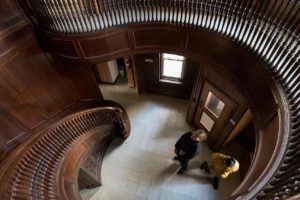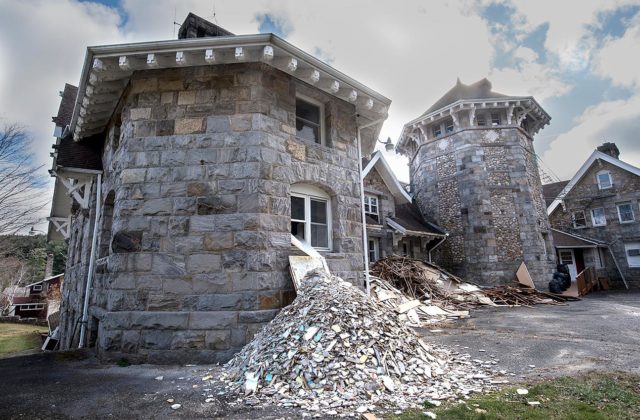Religious Compound Plans Cultural Center
Organization seeks greater contact with the surrounding community
By Wiley Wood
On a recent day, piles of construction debris formed mounds under the windows of the stone mansion on Westside Road belonging to the Confucian Study Association.
The building is undergoing major renovations, according to the association’s secretary and spokesman, Craig Chung. The plan is to open the building to the public on a limited basis as a cultural center, perhaps as early as August 2018.
“We want to be useful to the community,” said Chung, who envisages a research and conference facility centered on religion. “We would like the center to grow gradually, depending on public acceptance.”

A wood-paneled reception hall on the first floor is being restored.
The mansion was built in 1907 by Columbia University professor Michael Pupin, then bought by the Bruderhof Communities in 1958 to use as a Christian commune and manufacturing center. In 1999, it was sold to the Mission of Tao-Confucian, who transferred it to the present owners in March 2016.
“We are not yet sure how much we want to restore and how much we want to spend,” said Chung. “Hopefully, we can open the whole building and make it available to everyone.”
A three-sided display panel in a modest room off the grand entry hall posts information in English and Mandarin about the three major religions of East Asia: Buddhism, Taoism and Confucianism. Chung’s vision is ecumenical. A large photomural on one wall depicts a cutaway view of an apple tree and asks “Where is your root?”
Next door is a wood-paneled reception hall extending almost the full width of the building, with coffered ceilings and a large stone hearth. The space was divided into a warren of smaller rooms during the Bruderhof era. The floor and ceiling are scarred where Chung’s workers have removed the sheetrock and timber partitions. Chung pointed out that the Christian sect owned the building for forty years, during which the commune’s population was about 350 people.

A sweeping spiral staircase greets the visitor at the main entrance.
He deflects a query about the number of residents on the compound now. “The number wouldn’t mean anything. It is always changing,” said Chung. A group of eight or ten workers spent time this past summer clearing away a tangle of vegetation from the compound’s front wall and re-cementing its stones. “We have volunteer helpers come from many places, mostly Taiwan,” said Chung. Many do not speak English, and Chung has turned to the leaders of the Congregational church in Norfolk for help in finding ESL classes.
The impetus to renovate and find a use for the mansion is fueled in part by a desire to lower the organization’s tax burden. Under its present agreement with the town, negotiated in the wake of a court case, the organization pays taxes on those parts of the compound that it does not use for religious purposes. The portions exempted from taxes include a temple, which doubles as a dining hall, and five other dwellings and outbuildings. There are 16 buildings in all on the 48-acre property.
“I am grateful to the town,” said Chung, “because it has motivated us to use the place better. This summer we used all of the buildings.”
Chung pointed to the coffered ceiling of the reception hall, covered in the center by a large canvas. Traces of its original design survive around the edges, but most of it was overpainted in flat white house paint by the Bruderhof. Chung suggested that the woodwork might be restored but that the canvas may be beyond help, except for a small sample. “We want to restore it to the way it was, as well as we are able,” said Chung.
In the next room, formed by an octagonal tower, a partially dismantled staircase rose to the floor above. “That staircase was in the wrong place, but we will relocate it,” said Chung. “You could see the octagon from outside but not from inside.”
Separately, the Confucian Study Association has applied to the town’s commissions for permission to install a 100-kilowatt solar panel array in the low ground near Spaulding Brook. Chung explained that it would be used to supply the electric needs of the complex.
“I would like to have the neighbors know what we are doing,” said Chung. He suggested that Norfolk residents could email him (craigschung@gmail.com) if they had questions to ask or ideas about how to use the property.
“It is already beautiful,” said Chung, “but with work we hope to make it more beautiful. However, that is only the surface: we want it to be useful to the community.”
Photo, top: The stone mansion on West Side Road was turned into a dormitory when it was owned by the Deerspring Bruderhof, but its present owner, the Confucian Study Association, is undoing much of that work. All photos by Bruce Frisch.

